Qantas Group's Strategy Analysis: BUSS 5424, UniSA Report
VerifiedAdded on 2023/04/20
|15
|4300
|418
Report
AI Summary
This report provides a comprehensive analysis of Qantas Group's strategy in light of the Emirates-Malaysian Airlines alliance. It identifies key strategic issues and problems affecting Qantas' operations, including environmental factors, social practices, and internal challenges such as change management and unsolved salary issues. The report diagnoses these issues using social metrics and recommends adopting corporate governance principles. The analysis covers aspects like ineffective change management, worker dissatisfaction, and security concerns. Ultimately, the report suggests measures to improve Qantas' competitive position in the Asian air routes, focusing on internal improvements and external adaptations to market dynamics. Desklib offers this assignment solution and many other resources for students.
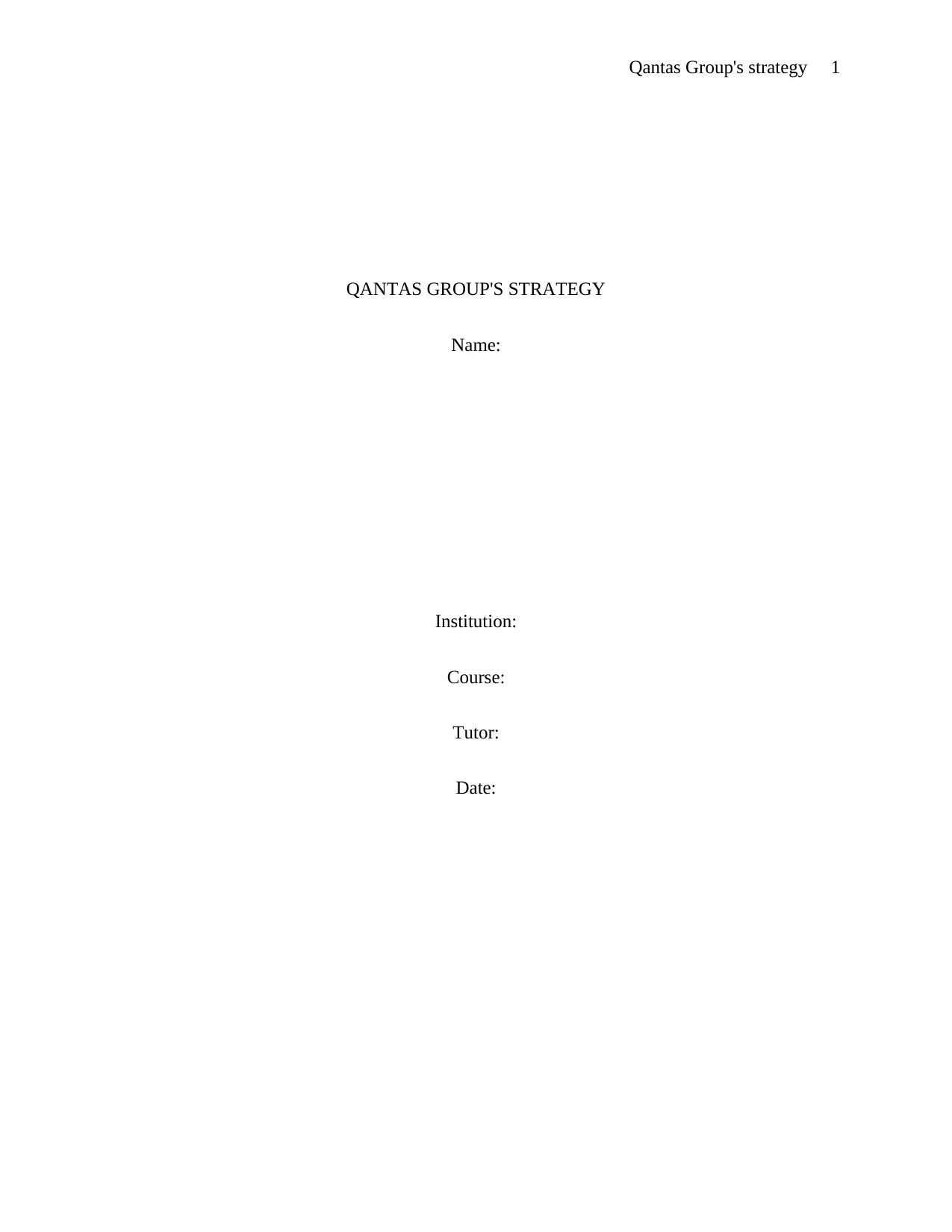
Qantas Group's strategy 1
QANTAS GROUP'S STRATEGY
Name:
Institution:
Course:
Tutor:
Date:
QANTAS GROUP'S STRATEGY
Name:
Institution:
Course:
Tutor:
Date:
Paraphrase This Document
Need a fresh take? Get an instant paraphrase of this document with our AI Paraphraser
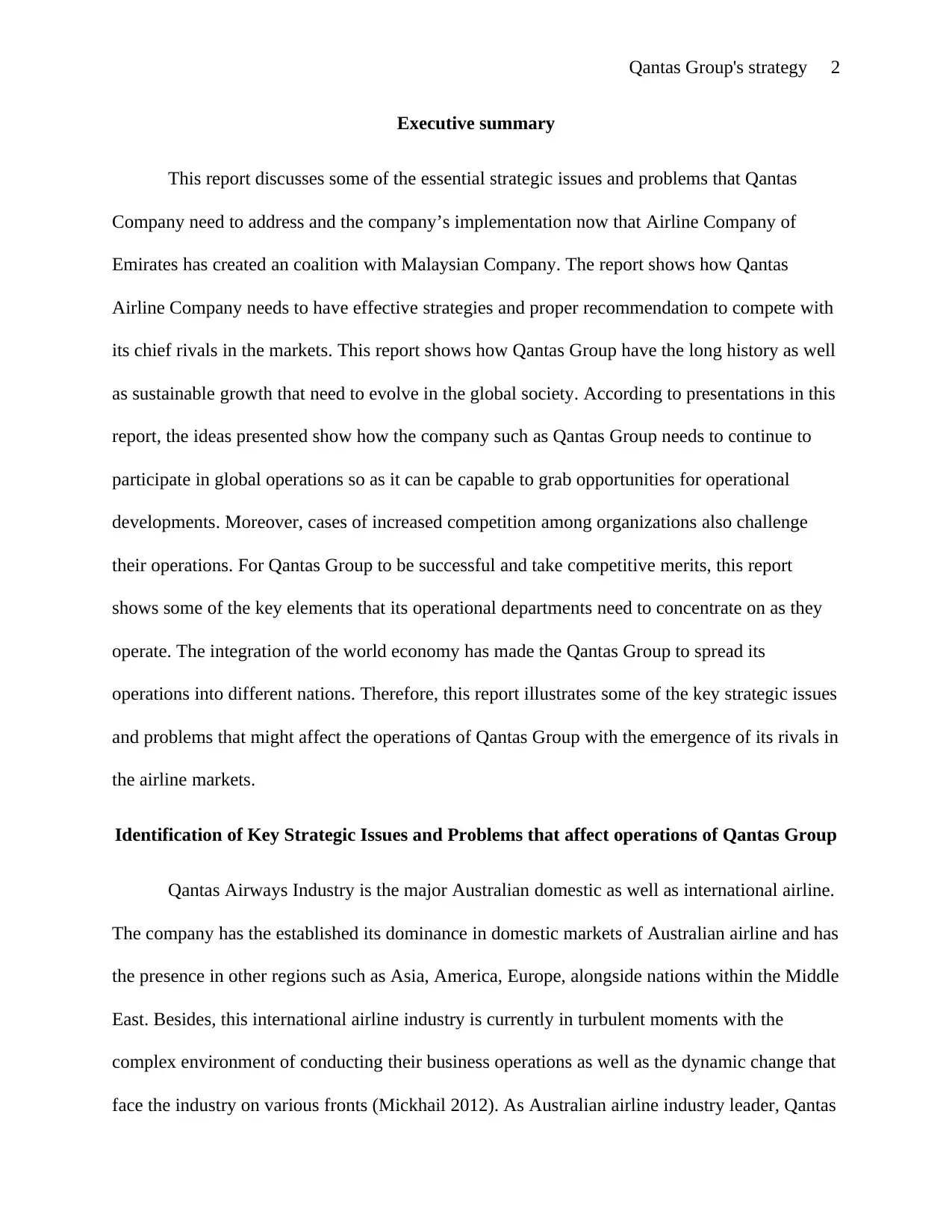
Qantas Group's strategy 2
Executive summary
This report discusses some of the essential strategic issues and problems that Qantas
Company need to address and the company’s implementation now that Airline Company of
Emirates has created an coalition with Malaysian Company. The report shows how Qantas
Airline Company needs to have effective strategies and proper recommendation to compete with
its chief rivals in the markets. This report shows how Qantas Group have the long history as well
as sustainable growth that need to evolve in the global society. According to presentations in this
report, the ideas presented show how the company such as Qantas Group needs to continue to
participate in global operations so as it can be capable to grab opportunities for operational
developments. Moreover, cases of increased competition among organizations also challenge
their operations. For Qantas Group to be successful and take competitive merits, this report
shows some of the key elements that its operational departments need to concentrate on as they
operate. The integration of the world economy has made the Qantas Group to spread its
operations into different nations. Therefore, this report illustrates some of the key strategic issues
and problems that might affect the operations of Qantas Group with the emergence of its rivals in
the airline markets.
Identification of Key Strategic Issues and Problems that affect operations of Qantas Group
Qantas Airways Industry is the major Australian domestic as well as international airline.
The company has the established its dominance in domestic markets of Australian airline and has
the presence in other regions such as Asia, America, Europe, alongside nations within the Middle
East. Besides, this international airline industry is currently in turbulent moments with the
complex environment of conducting their business operations as well as the dynamic change that
face the industry on various fronts (Mickhail 2012). As Australian airline industry leader, Qantas
Executive summary
This report discusses some of the essential strategic issues and problems that Qantas
Company need to address and the company’s implementation now that Airline Company of
Emirates has created an coalition with Malaysian Company. The report shows how Qantas
Airline Company needs to have effective strategies and proper recommendation to compete with
its chief rivals in the markets. This report shows how Qantas Group have the long history as well
as sustainable growth that need to evolve in the global society. According to presentations in this
report, the ideas presented show how the company such as Qantas Group needs to continue to
participate in global operations so as it can be capable to grab opportunities for operational
developments. Moreover, cases of increased competition among organizations also challenge
their operations. For Qantas Group to be successful and take competitive merits, this report
shows some of the key elements that its operational departments need to concentrate on as they
operate. The integration of the world economy has made the Qantas Group to spread its
operations into different nations. Therefore, this report illustrates some of the key strategic issues
and problems that might affect the operations of Qantas Group with the emergence of its rivals in
the airline markets.
Identification of Key Strategic Issues and Problems that affect operations of Qantas Group
Qantas Airways Industry is the major Australian domestic as well as international airline.
The company has the established its dominance in domestic markets of Australian airline and has
the presence in other regions such as Asia, America, Europe, alongside nations within the Middle
East. Besides, this international airline industry is currently in turbulent moments with the
complex environment of conducting their business operations as well as the dynamic change that
face the industry on various fronts (Mickhail 2012). As Australian airline industry leader, Qantas
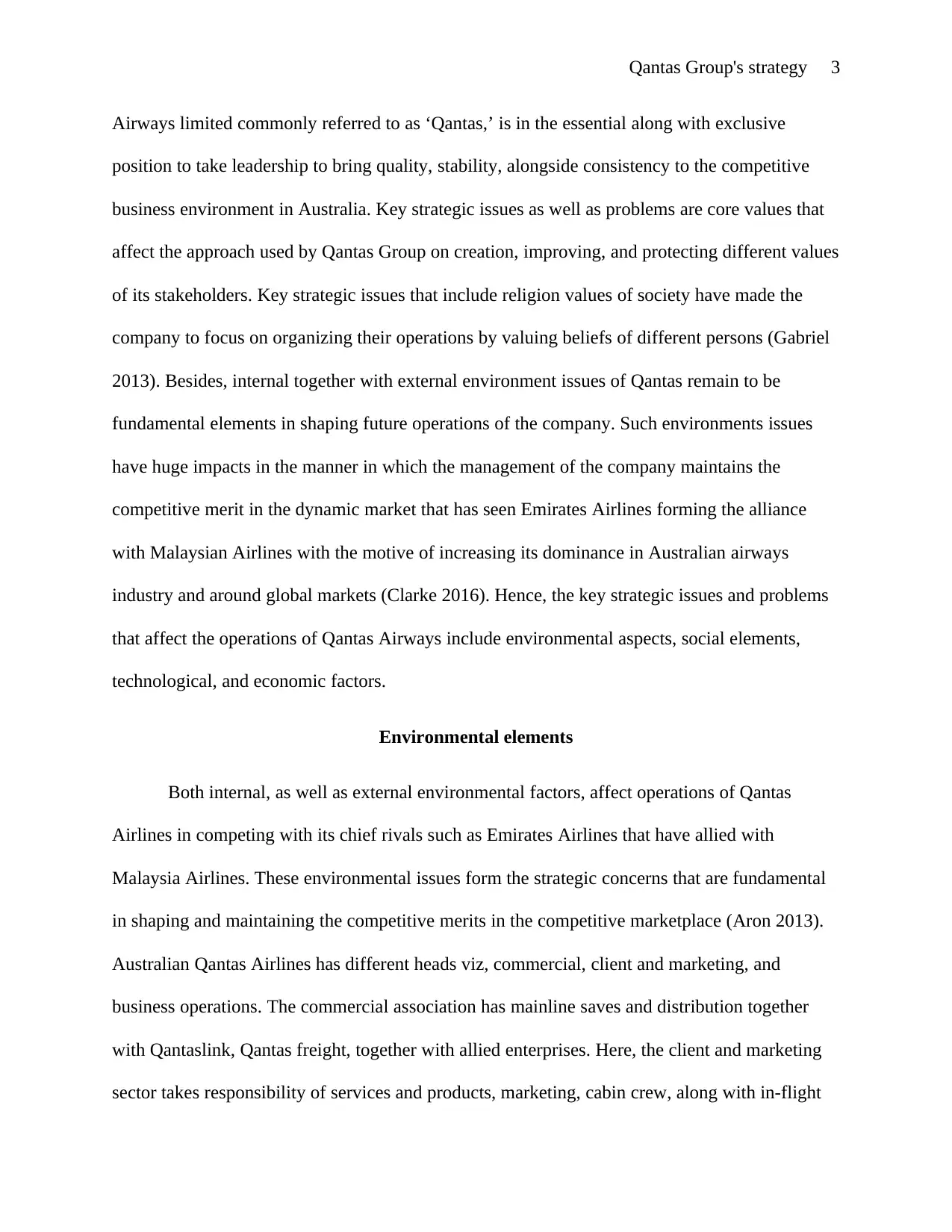
Qantas Group's strategy 3
Airways limited commonly referred to as ‘Qantas,’ is in the essential along with exclusive
position to take leadership to bring quality, stability, alongside consistency to the competitive
business environment in Australia. Key strategic issues as well as problems are core values that
affect the approach used by Qantas Group on creation, improving, and protecting different values
of its stakeholders. Key strategic issues that include religion values of society have made the
company to focus on organizing their operations by valuing beliefs of different persons (Gabriel
2013). Besides, internal together with external environment issues of Qantas remain to be
fundamental elements in shaping future operations of the company. Such environments issues
have huge impacts in the manner in which the management of the company maintains the
competitive merit in the dynamic market that has seen Emirates Airlines forming the alliance
with Malaysian Airlines with the motive of increasing its dominance in Australian airways
industry and around global markets (Clarke 2016). Hence, the key strategic issues and problems
that affect the operations of Qantas Airways include environmental aspects, social elements,
technological, and economic factors.
Environmental elements
Both internal, as well as external environmental factors, affect operations of Qantas
Airlines in competing with its chief rivals such as Emirates Airlines that have allied with
Malaysia Airlines. These environmental issues form the strategic concerns that are fundamental
in shaping and maintaining the competitive merits in the competitive marketplace (Aron 2013).
Australian Qantas Airlines has different heads viz, commercial, client and marketing, and
business operations. The commercial association has mainline saves and distribution together
with Qantaslink, Qantas freight, together with allied enterprises. Here, the client and marketing
sector takes responsibility of services and products, marketing, cabin crew, along with in-flight
Airways limited commonly referred to as ‘Qantas,’ is in the essential along with exclusive
position to take leadership to bring quality, stability, alongside consistency to the competitive
business environment in Australia. Key strategic issues as well as problems are core values that
affect the approach used by Qantas Group on creation, improving, and protecting different values
of its stakeholders. Key strategic issues that include religion values of society have made the
company to focus on organizing their operations by valuing beliefs of different persons (Gabriel
2013). Besides, internal together with external environment issues of Qantas remain to be
fundamental elements in shaping future operations of the company. Such environments issues
have huge impacts in the manner in which the management of the company maintains the
competitive merit in the dynamic market that has seen Emirates Airlines forming the alliance
with Malaysian Airlines with the motive of increasing its dominance in Australian airways
industry and around global markets (Clarke 2016). Hence, the key strategic issues and problems
that affect the operations of Qantas Airways include environmental aspects, social elements,
technological, and economic factors.
Environmental elements
Both internal, as well as external environmental factors, affect operations of Qantas
Airlines in competing with its chief rivals such as Emirates Airlines that have allied with
Malaysia Airlines. These environmental issues form the strategic concerns that are fundamental
in shaping and maintaining the competitive merits in the competitive marketplace (Aron 2013).
Australian Qantas Airlines has different heads viz, commercial, client and marketing, and
business operations. The commercial association has mainline saves and distribution together
with Qantaslink, Qantas freight, together with allied enterprises. Here, the client and marketing
sector takes responsibility of services and products, marketing, cabin crew, along with in-flight
⊘ This is a preview!⊘
Do you want full access?
Subscribe today to unlock all pages.

Trusted by 1+ million students worldwide
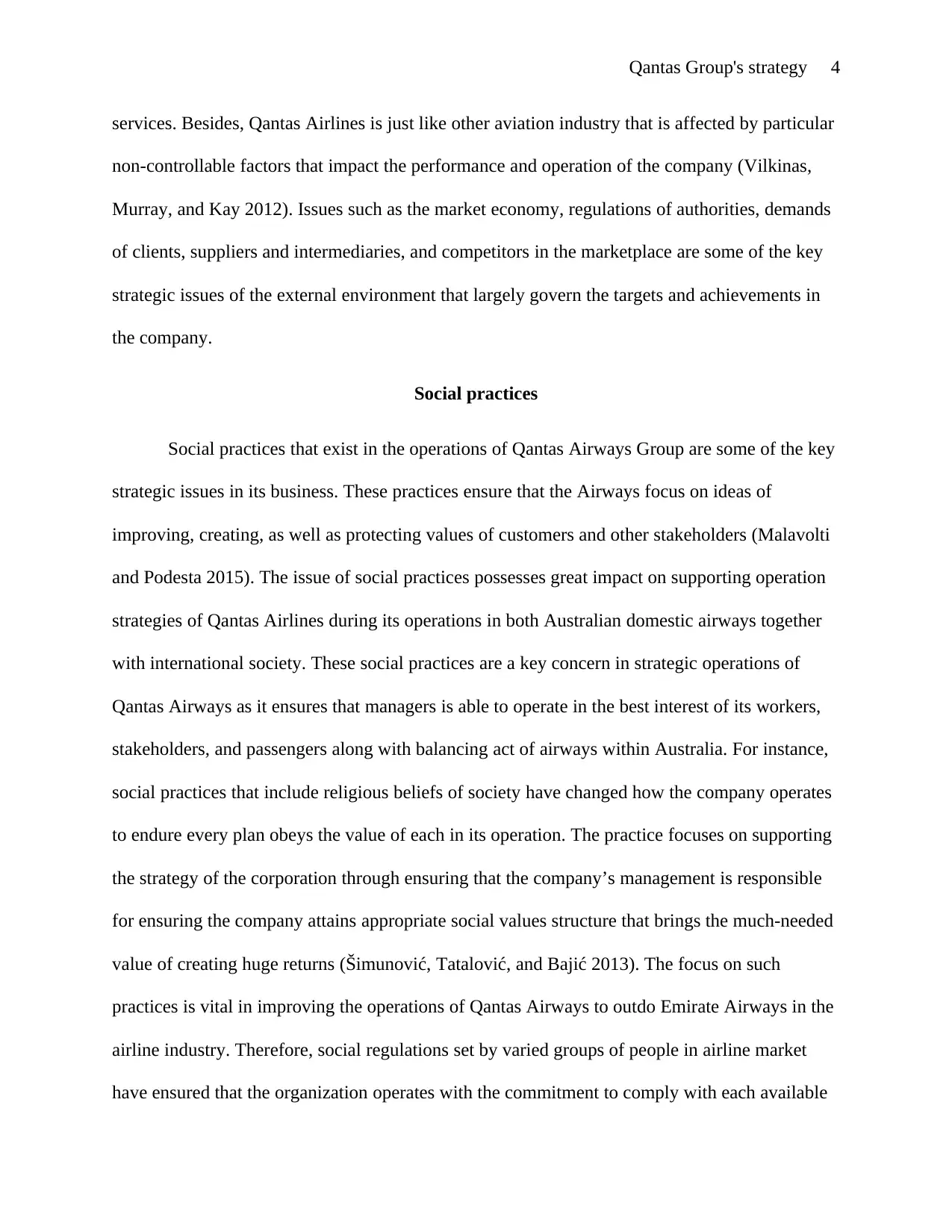
Qantas Group's strategy 4
services. Besides, Qantas Airlines is just like other aviation industry that is affected by particular
non-controllable factors that impact the performance and operation of the company (Vilkinas,
Murray, and Kay 2012). Issues such as the market economy, regulations of authorities, demands
of clients, suppliers and intermediaries, and competitors in the marketplace are some of the key
strategic issues of the external environment that largely govern the targets and achievements in
the company.
Social practices
Social practices that exist in the operations of Qantas Airways Group are some of the key
strategic issues in its business. These practices ensure that the Airways focus on ideas of
improving, creating, as well as protecting values of customers and other stakeholders (Malavolti
and Podesta 2015). The issue of social practices possesses great impact on supporting operation
strategies of Qantas Airlines during its operations in both Australian domestic airways together
with international society. These social practices are a key concern in strategic operations of
Qantas Airways as it ensures that managers is able to operate in the best interest of its workers,
stakeholders, and passengers along with balancing act of airways within Australia. For instance,
social practices that include religious beliefs of society have changed how the company operates
to endure every plan obeys the value of each in its operation. The practice focuses on supporting
the strategy of the corporation through ensuring that the company’s management is responsible
for ensuring the company attains appropriate social values structure that brings the much-needed
value of creating huge returns (Šimunović, Tatalović, and Bajić 2013). The focus on such
practices is vital in improving the operations of Qantas Airways to outdo Emirate Airways in the
airline industry. Therefore, social regulations set by varied groups of people in airline market
have ensured that the organization operates with the commitment to comply with each available
services. Besides, Qantas Airlines is just like other aviation industry that is affected by particular
non-controllable factors that impact the performance and operation of the company (Vilkinas,
Murray, and Kay 2012). Issues such as the market economy, regulations of authorities, demands
of clients, suppliers and intermediaries, and competitors in the marketplace are some of the key
strategic issues of the external environment that largely govern the targets and achievements in
the company.
Social practices
Social practices that exist in the operations of Qantas Airways Group are some of the key
strategic issues in its business. These practices ensure that the Airways focus on ideas of
improving, creating, as well as protecting values of customers and other stakeholders (Malavolti
and Podesta 2015). The issue of social practices possesses great impact on supporting operation
strategies of Qantas Airlines during its operations in both Australian domestic airways together
with international society. These social practices are a key concern in strategic operations of
Qantas Airways as it ensures that managers is able to operate in the best interest of its workers,
stakeholders, and passengers along with balancing act of airways within Australia. For instance,
social practices that include religious beliefs of society have changed how the company operates
to endure every plan obeys the value of each in its operation. The practice focuses on supporting
the strategy of the corporation through ensuring that the company’s management is responsible
for ensuring the company attains appropriate social values structure that brings the much-needed
value of creating huge returns (Šimunović, Tatalović, and Bajić 2013). The focus on such
practices is vital in improving the operations of Qantas Airways to outdo Emirate Airways in the
airline industry. Therefore, social regulations set by varied groups of people in airline market
have ensured that the organization operates with the commitment to comply with each available
Paraphrase This Document
Need a fresh take? Get an instant paraphrase of this document with our AI Paraphraser
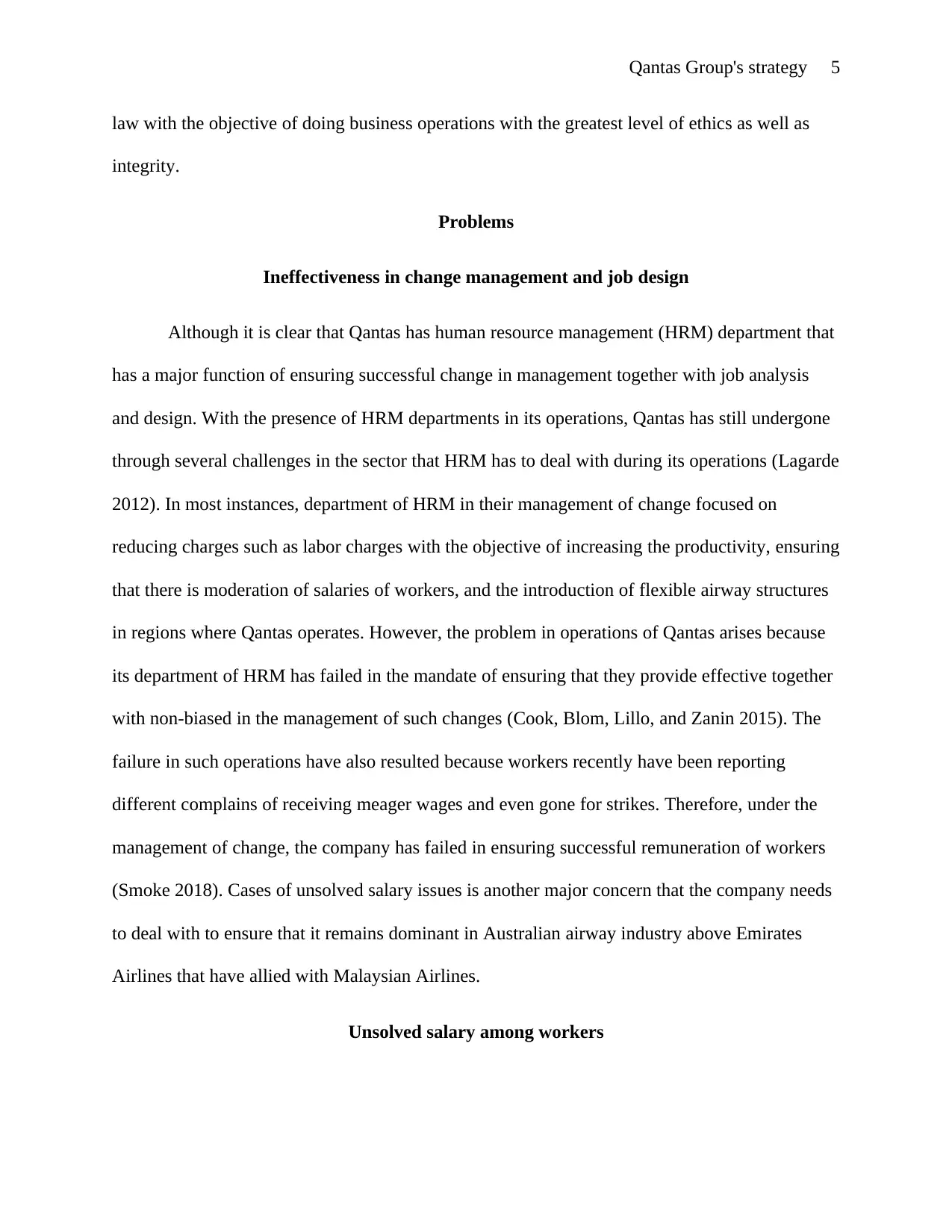
Qantas Group's strategy 5
law with the objective of doing business operations with the greatest level of ethics as well as
integrity.
Problems
Ineffectiveness in change management and job design
Although it is clear that Qantas has human resource management (HRM) department that
has a major function of ensuring successful change in management together with job analysis
and design. With the presence of HRM departments in its operations, Qantas has still undergone
through several challenges in the sector that HRM has to deal with during its operations (Lagarde
2012). In most instances, department of HRM in their management of change focused on
reducing charges such as labor charges with the objective of increasing the productivity, ensuring
that there is moderation of salaries of workers, and the introduction of flexible airway structures
in regions where Qantas operates. However, the problem in operations of Qantas arises because
its department of HRM has failed in the mandate of ensuring that they provide effective together
with non-biased in the management of such changes (Cook, Blom, Lillo, and Zanin 2015). The
failure in such operations have also resulted because workers recently have been reporting
different complains of receiving meager wages and even gone for strikes. Therefore, under the
management of change, the company has failed in ensuring successful remuneration of workers
(Smoke 2018). Cases of unsolved salary issues is another major concern that the company needs
to deal with to ensure that it remains dominant in Australian airway industry above Emirates
Airlines that have allied with Malaysian Airlines.
Unsolved salary among workers
law with the objective of doing business operations with the greatest level of ethics as well as
integrity.
Problems
Ineffectiveness in change management and job design
Although it is clear that Qantas has human resource management (HRM) department that
has a major function of ensuring successful change in management together with job analysis
and design. With the presence of HRM departments in its operations, Qantas has still undergone
through several challenges in the sector that HRM has to deal with during its operations (Lagarde
2012). In most instances, department of HRM in their management of change focused on
reducing charges such as labor charges with the objective of increasing the productivity, ensuring
that there is moderation of salaries of workers, and the introduction of flexible airway structures
in regions where Qantas operates. However, the problem in operations of Qantas arises because
its department of HRM has failed in the mandate of ensuring that they provide effective together
with non-biased in the management of such changes (Cook, Blom, Lillo, and Zanin 2015). The
failure in such operations have also resulted because workers recently have been reporting
different complains of receiving meager wages and even gone for strikes. Therefore, under the
management of change, the company has failed in ensuring successful remuneration of workers
(Smoke 2018). Cases of unsolved salary issues is another major concern that the company needs
to deal with to ensure that it remains dominant in Australian airway industry above Emirates
Airlines that have allied with Malaysian Airlines.
Unsolved salary among workers
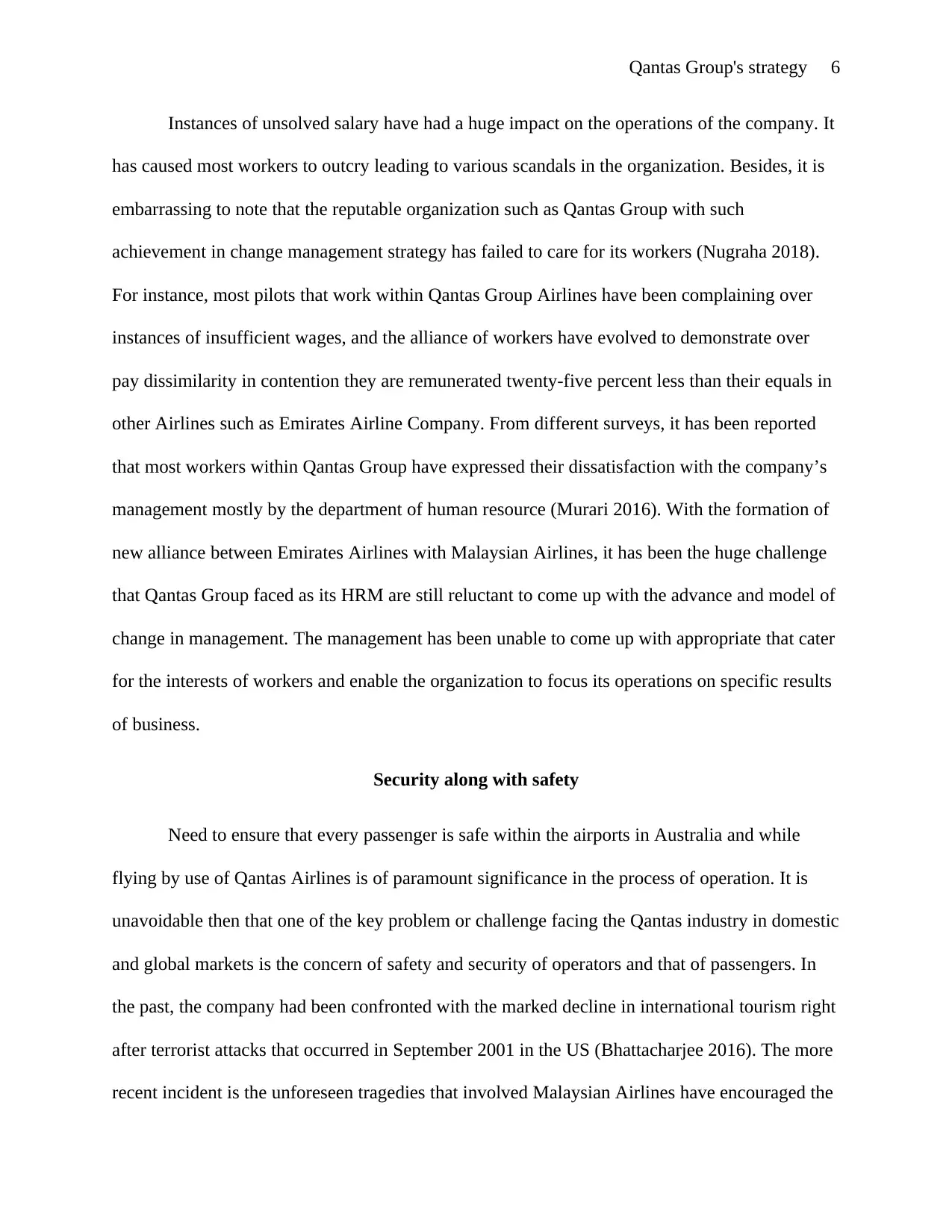
Qantas Group's strategy 6
Instances of unsolved salary have had a huge impact on the operations of the company. It
has caused most workers to outcry leading to various scandals in the organization. Besides, it is
embarrassing to note that the reputable organization such as Qantas Group with such
achievement in change management strategy has failed to care for its workers (Nugraha 2018).
For instance, most pilots that work within Qantas Group Airlines have been complaining over
instances of insufficient wages, and the alliance of workers have evolved to demonstrate over
pay dissimilarity in contention they are remunerated twenty-five percent less than their equals in
other Airlines such as Emirates Airline Company. From different surveys, it has been reported
that most workers within Qantas Group have expressed their dissatisfaction with the company’s
management mostly by the department of human resource (Murari 2016). With the formation of
new alliance between Emirates Airlines with Malaysian Airlines, it has been the huge challenge
that Qantas Group faced as its HRM are still reluctant to come up with the advance and model of
change in management. The management has been unable to come up with appropriate that cater
for the interests of workers and enable the organization to focus its operations on specific results
of business.
Security along with safety
Need to ensure that every passenger is safe within the airports in Australia and while
flying by use of Qantas Airlines is of paramount significance in the process of operation. It is
unavoidable then that one of the key problem or challenge facing the Qantas industry in domestic
and global markets is the concern of safety and security of operators and that of passengers. In
the past, the company had been confronted with the marked decline in international tourism right
after terrorist attacks that occurred in September 2001 in the US (Bhattacharjee 2016). The more
recent incident is the unforeseen tragedies that involved Malaysian Airlines have encouraged the
Instances of unsolved salary have had a huge impact on the operations of the company. It
has caused most workers to outcry leading to various scandals in the organization. Besides, it is
embarrassing to note that the reputable organization such as Qantas Group with such
achievement in change management strategy has failed to care for its workers (Nugraha 2018).
For instance, most pilots that work within Qantas Group Airlines have been complaining over
instances of insufficient wages, and the alliance of workers have evolved to demonstrate over
pay dissimilarity in contention they are remunerated twenty-five percent less than their equals in
other Airlines such as Emirates Airline Company. From different surveys, it has been reported
that most workers within Qantas Group have expressed their dissatisfaction with the company’s
management mostly by the department of human resource (Murari 2016). With the formation of
new alliance between Emirates Airlines with Malaysian Airlines, it has been the huge challenge
that Qantas Group faced as its HRM are still reluctant to come up with the advance and model of
change in management. The management has been unable to come up with appropriate that cater
for the interests of workers and enable the organization to focus its operations on specific results
of business.
Security along with safety
Need to ensure that every passenger is safe within the airports in Australia and while
flying by use of Qantas Airlines is of paramount significance in the process of operation. It is
unavoidable then that one of the key problem or challenge facing the Qantas industry in domestic
and global markets is the concern of safety and security of operators and that of passengers. In
the past, the company had been confronted with the marked decline in international tourism right
after terrorist attacks that occurred in September 2001 in the US (Bhattacharjee 2016). The more
recent incident is the unforeseen tragedies that involved Malaysian Airlines have encouraged the
⊘ This is a preview!⊘
Do you want full access?
Subscribe today to unlock all pages.

Trusted by 1+ million students worldwide
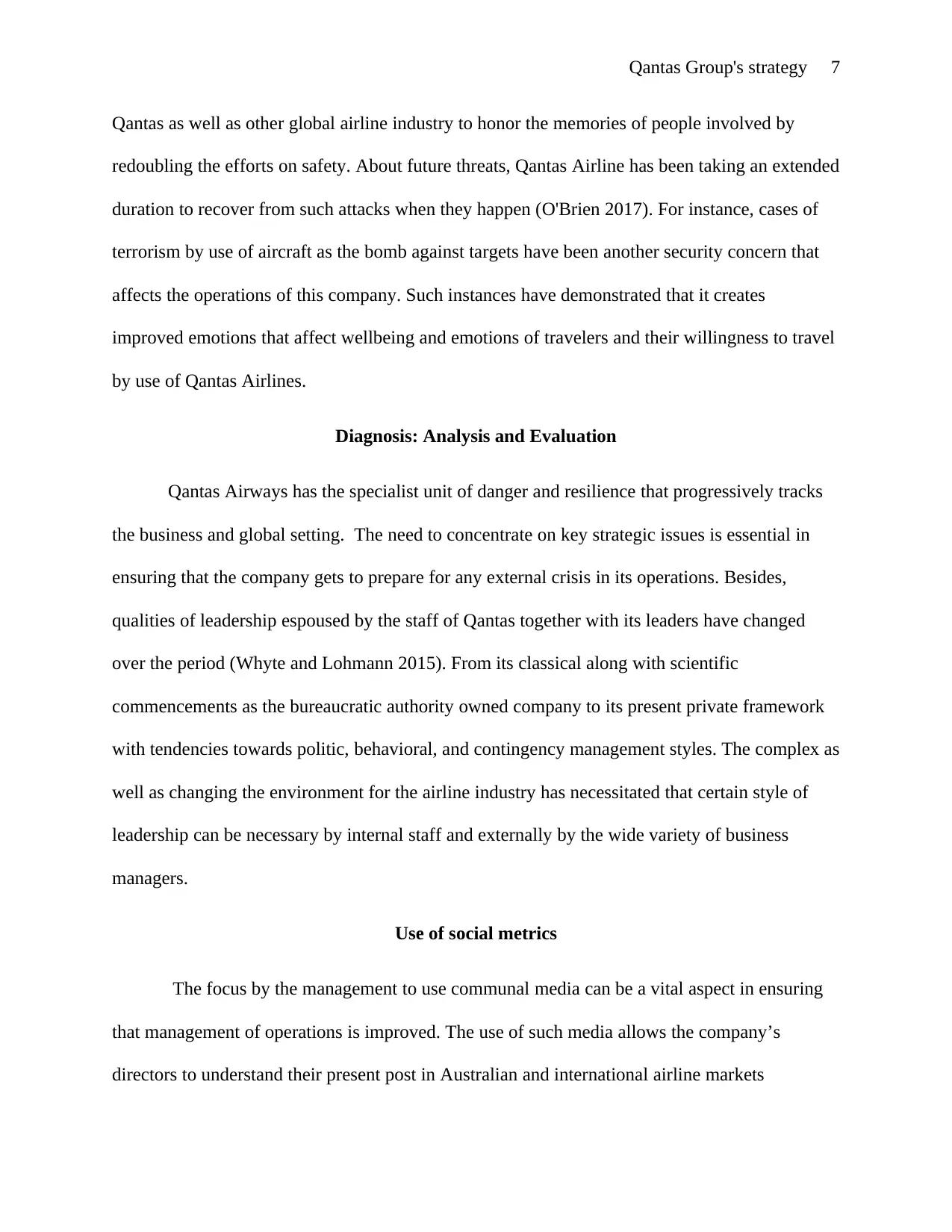
Qantas Group's strategy 7
Qantas as well as other global airline industry to honor the memories of people involved by
redoubling the efforts on safety. About future threats, Qantas Airline has been taking an extended
duration to recover from such attacks when they happen (O'Brien 2017). For instance, cases of
terrorism by use of aircraft as the bomb against targets have been another security concern that
affects the operations of this company. Such instances have demonstrated that it creates
improved emotions that affect wellbeing and emotions of travelers and their willingness to travel
by use of Qantas Airlines.
Diagnosis: Analysis and Evaluation
Qantas Airways has the specialist unit of danger and resilience that progressively tracks
the business and global setting. The need to concentrate on key strategic issues is essential in
ensuring that the company gets to prepare for any external crisis in its operations. Besides,
qualities of leadership espoused by the staff of Qantas together with its leaders have changed
over the period (Whyte and Lohmann 2015). From its classical along with scientific
commencements as the bureaucratic authority owned company to its present private framework
with tendencies towards politic, behavioral, and contingency management styles. The complex as
well as changing the environment for the airline industry has necessitated that certain style of
leadership can be necessary by internal staff and externally by the wide variety of business
managers.
Use of social metrics
The focus by the management to use communal media can be a vital aspect in ensuring
that management of operations is improved. The use of such media allows the company’s
directors to understand their present post in Australian and international airline markets
Qantas as well as other global airline industry to honor the memories of people involved by
redoubling the efforts on safety. About future threats, Qantas Airline has been taking an extended
duration to recover from such attacks when they happen (O'Brien 2017). For instance, cases of
terrorism by use of aircraft as the bomb against targets have been another security concern that
affects the operations of this company. Such instances have demonstrated that it creates
improved emotions that affect wellbeing and emotions of travelers and their willingness to travel
by use of Qantas Airlines.
Diagnosis: Analysis and Evaluation
Qantas Airways has the specialist unit of danger and resilience that progressively tracks
the business and global setting. The need to concentrate on key strategic issues is essential in
ensuring that the company gets to prepare for any external crisis in its operations. Besides,
qualities of leadership espoused by the staff of Qantas together with its leaders have changed
over the period (Whyte and Lohmann 2015). From its classical along with scientific
commencements as the bureaucratic authority owned company to its present private framework
with tendencies towards politic, behavioral, and contingency management styles. The complex as
well as changing the environment for the airline industry has necessitated that certain style of
leadership can be necessary by internal staff and externally by the wide variety of business
managers.
Use of social metrics
The focus by the management to use communal media can be a vital aspect in ensuring
that management of operations is improved. The use of such media allows the company’s
directors to understand their present post in Australian and international airline markets
Paraphrase This Document
Need a fresh take? Get an instant paraphrase of this document with our AI Paraphraser
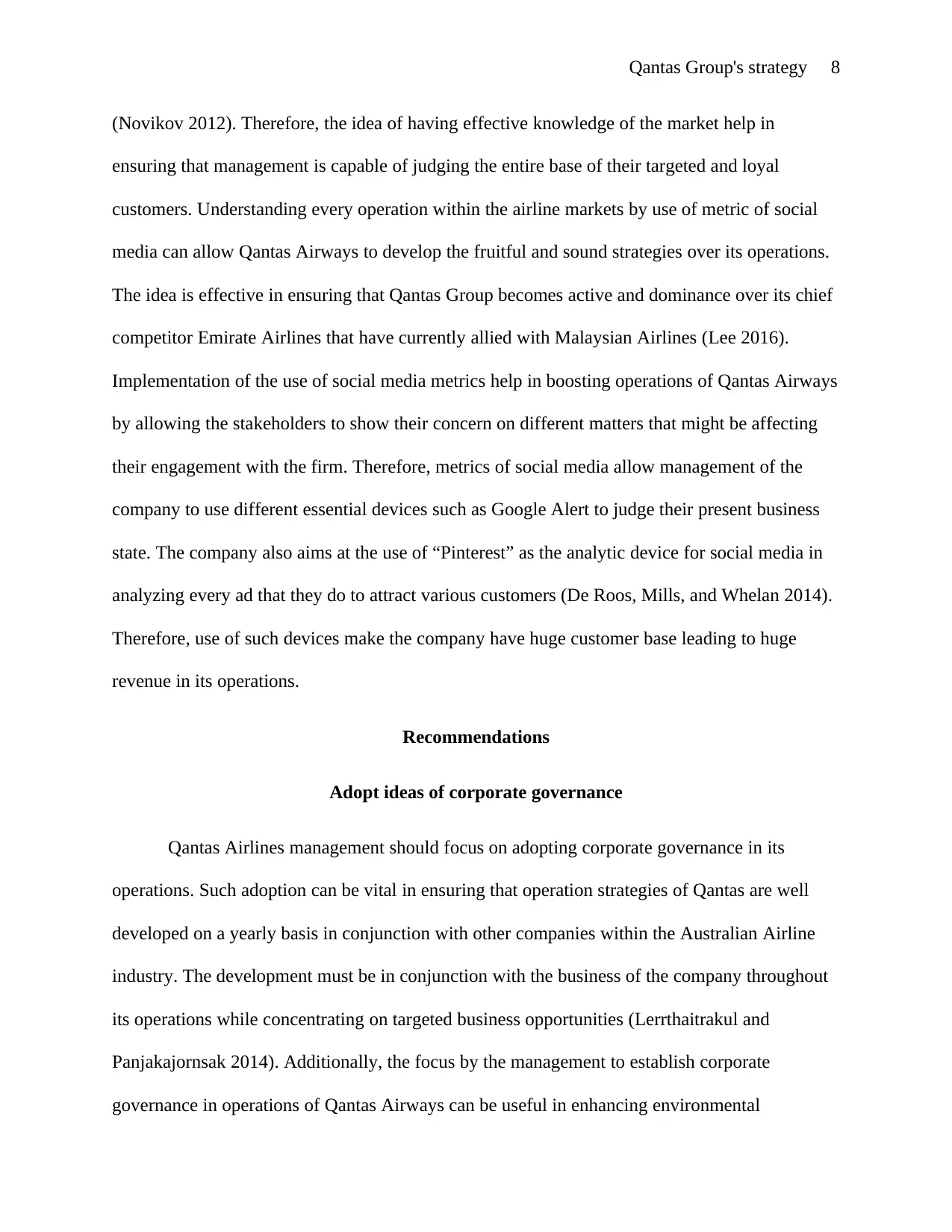
Qantas Group's strategy 8
(Novikov 2012). Therefore, the idea of having effective knowledge of the market help in
ensuring that management is capable of judging the entire base of their targeted and loyal
customers. Understanding every operation within the airline markets by use of metric of social
media can allow Qantas Airways to develop the fruitful and sound strategies over its operations.
The idea is effective in ensuring that Qantas Group becomes active and dominance over its chief
competitor Emirate Airlines that have currently allied with Malaysian Airlines (Lee 2016).
Implementation of the use of social media metrics help in boosting operations of Qantas Airways
by allowing the stakeholders to show their concern on different matters that might be affecting
their engagement with the firm. Therefore, metrics of social media allow management of the
company to use different essential devices such as Google Alert to judge their present business
state. The company also aims at the use of “Pinterest” as the analytic device for social media in
analyzing every ad that they do to attract various customers (De Roos, Mills, and Whelan 2014).
Therefore, use of such devices make the company have huge customer base leading to huge
revenue in its operations.
Recommendations
Adopt ideas of corporate governance
Qantas Airlines management should focus on adopting corporate governance in its
operations. Such adoption can be vital in ensuring that operation strategies of Qantas are well
developed on a yearly basis in conjunction with other companies within the Australian Airline
industry. The development must be in conjunction with the business of the company throughout
its operations while concentrating on targeted business opportunities (Lerrthaitrakul and
Panjakajornsak 2014). Additionally, the focus by the management to establish corporate
governance in operations of Qantas Airways can be useful in enhancing environmental
(Novikov 2012). Therefore, the idea of having effective knowledge of the market help in
ensuring that management is capable of judging the entire base of their targeted and loyal
customers. Understanding every operation within the airline markets by use of metric of social
media can allow Qantas Airways to develop the fruitful and sound strategies over its operations.
The idea is effective in ensuring that Qantas Group becomes active and dominance over its chief
competitor Emirate Airlines that have currently allied with Malaysian Airlines (Lee 2016).
Implementation of the use of social media metrics help in boosting operations of Qantas Airways
by allowing the stakeholders to show their concern on different matters that might be affecting
their engagement with the firm. Therefore, metrics of social media allow management of the
company to use different essential devices such as Google Alert to judge their present business
state. The company also aims at the use of “Pinterest” as the analytic device for social media in
analyzing every ad that they do to attract various customers (De Roos, Mills, and Whelan 2014).
Therefore, use of such devices make the company have huge customer base leading to huge
revenue in its operations.
Recommendations
Adopt ideas of corporate governance
Qantas Airlines management should focus on adopting corporate governance in its
operations. Such adoption can be vital in ensuring that operation strategies of Qantas are well
developed on a yearly basis in conjunction with other companies within the Australian Airline
industry. The development must be in conjunction with the business of the company throughout
its operations while concentrating on targeted business opportunities (Lerrthaitrakul and
Panjakajornsak 2014). Additionally, the focus by the management to establish corporate
governance in operations of Qantas Airways can be useful in enhancing environmental
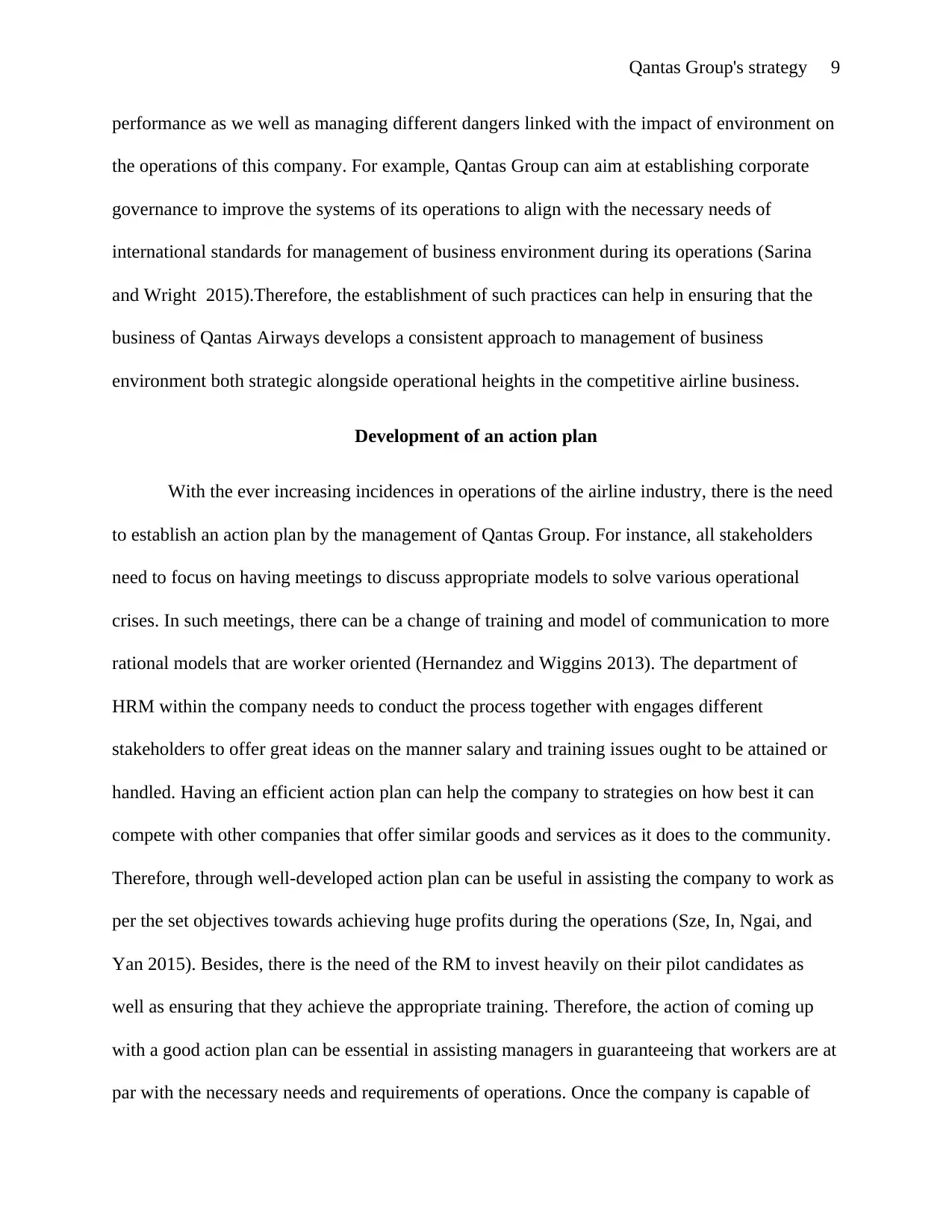
Qantas Group's strategy 9
performance as we well as managing different dangers linked with the impact of environment on
the operations of this company. For example, Qantas Group can aim at establishing corporate
governance to improve the systems of its operations to align with the necessary needs of
international standards for management of business environment during its operations (Sarina
and Wright 2015).Therefore, the establishment of such practices can help in ensuring that the
business of Qantas Airways develops a consistent approach to management of business
environment both strategic alongside operational heights in the competitive airline business.
Development of an action plan
With the ever increasing incidences in operations of the airline industry, there is the need
to establish an action plan by the management of Qantas Group. For instance, all stakeholders
need to focus on having meetings to discuss appropriate models to solve various operational
crises. In such meetings, there can be a change of training and model of communication to more
rational models that are worker oriented (Hernandez and Wiggins 2013). The department of
HRM within the company needs to conduct the process together with engages different
stakeholders to offer great ideas on the manner salary and training issues ought to be attained or
handled. Having an efficient action plan can help the company to strategies on how best it can
compete with other companies that offer similar goods and services as it does to the community.
Therefore, through well-developed action plan can be useful in assisting the company to work as
per the set objectives towards achieving huge profits during the operations (Sze, In, Ngai, and
Yan 2015). Besides, there is the need of the RM to invest heavily on their pilot candidates as
well as ensuring that they achieve the appropriate training. Therefore, the action of coming up
with a good action plan can be essential in assisting managers in guaranteeing that workers are at
par with the necessary needs and requirements of operations. Once the company is capable of
performance as we well as managing different dangers linked with the impact of environment on
the operations of this company. For example, Qantas Group can aim at establishing corporate
governance to improve the systems of its operations to align with the necessary needs of
international standards for management of business environment during its operations (Sarina
and Wright 2015).Therefore, the establishment of such practices can help in ensuring that the
business of Qantas Airways develops a consistent approach to management of business
environment both strategic alongside operational heights in the competitive airline business.
Development of an action plan
With the ever increasing incidences in operations of the airline industry, there is the need
to establish an action plan by the management of Qantas Group. For instance, all stakeholders
need to focus on having meetings to discuss appropriate models to solve various operational
crises. In such meetings, there can be a change of training and model of communication to more
rational models that are worker oriented (Hernandez and Wiggins 2013). The department of
HRM within the company needs to conduct the process together with engages different
stakeholders to offer great ideas on the manner salary and training issues ought to be attained or
handled. Having an efficient action plan can help the company to strategies on how best it can
compete with other companies that offer similar goods and services as it does to the community.
Therefore, through well-developed action plan can be useful in assisting the company to work as
per the set objectives towards achieving huge profits during the operations (Sze, In, Ngai, and
Yan 2015). Besides, there is the need of the RM to invest heavily on their pilot candidates as
well as ensuring that they achieve the appropriate training. Therefore, the action of coming up
with a good action plan can be essential in assisting managers in guaranteeing that workers are at
par with the necessary needs and requirements of operations. Once the company is capable of
⊘ This is a preview!⊘
Do you want full access?
Subscribe today to unlock all pages.

Trusted by 1+ million students worldwide
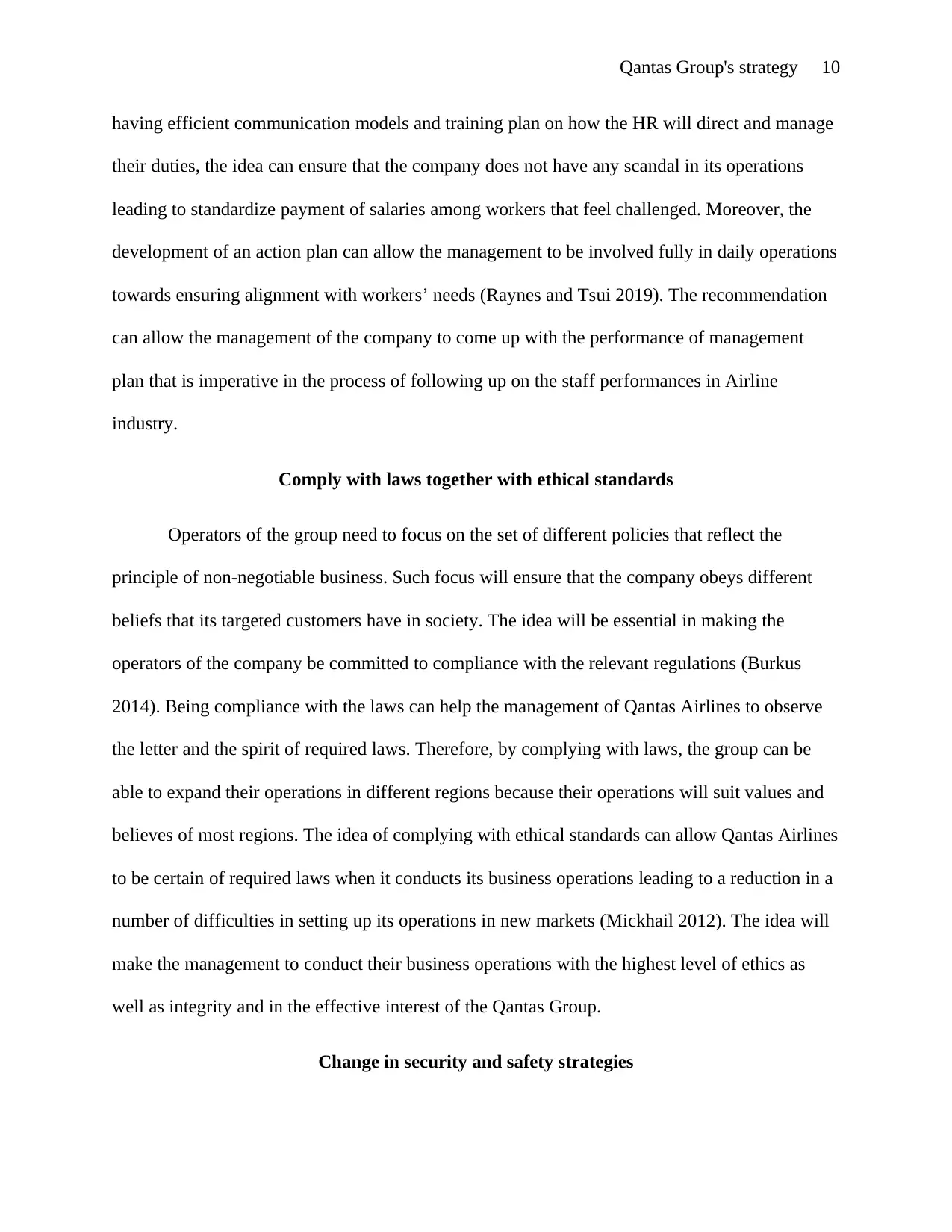
Qantas Group's strategy 10
having efficient communication models and training plan on how the HR will direct and manage
their duties, the idea can ensure that the company does not have any scandal in its operations
leading to standardize payment of salaries among workers that feel challenged. Moreover, the
development of an action plan can allow the management to be involved fully in daily operations
towards ensuring alignment with workers’ needs (Raynes and Tsui 2019). The recommendation
can allow the management of the company to come up with the performance of management
plan that is imperative in the process of following up on the staff performances in Airline
industry.
Comply with laws together with ethical standards
Operators of the group need to focus on the set of different policies that reflect the
principle of non-negotiable business. Such focus will ensure that the company obeys different
beliefs that its targeted customers have in society. The idea will be essential in making the
operators of the company be committed to compliance with the relevant regulations (Burkus
2014). Being compliance with the laws can help the management of Qantas Airlines to observe
the letter and the spirit of required laws. Therefore, by complying with laws, the group can be
able to expand their operations in different regions because their operations will suit values and
believes of most regions. The idea of complying with ethical standards can allow Qantas Airlines
to be certain of required laws when it conducts its business operations leading to a reduction in a
number of difficulties in setting up its operations in new markets (Mickhail 2012). The idea will
make the management to conduct their business operations with the highest level of ethics as
well as integrity and in the effective interest of the Qantas Group.
Change in security and safety strategies
having efficient communication models and training plan on how the HR will direct and manage
their duties, the idea can ensure that the company does not have any scandal in its operations
leading to standardize payment of salaries among workers that feel challenged. Moreover, the
development of an action plan can allow the management to be involved fully in daily operations
towards ensuring alignment with workers’ needs (Raynes and Tsui 2019). The recommendation
can allow the management of the company to come up with the performance of management
plan that is imperative in the process of following up on the staff performances in Airline
industry.
Comply with laws together with ethical standards
Operators of the group need to focus on the set of different policies that reflect the
principle of non-negotiable business. Such focus will ensure that the company obeys different
beliefs that its targeted customers have in society. The idea will be essential in making the
operators of the company be committed to compliance with the relevant regulations (Burkus
2014). Being compliance with the laws can help the management of Qantas Airlines to observe
the letter and the spirit of required laws. Therefore, by complying with laws, the group can be
able to expand their operations in different regions because their operations will suit values and
believes of most regions. The idea of complying with ethical standards can allow Qantas Airlines
to be certain of required laws when it conducts its business operations leading to a reduction in a
number of difficulties in setting up its operations in new markets (Mickhail 2012). The idea will
make the management to conduct their business operations with the highest level of ethics as
well as integrity and in the effective interest of the Qantas Group.
Change in security and safety strategies
Paraphrase This Document
Need a fresh take? Get an instant paraphrase of this document with our AI Paraphraser
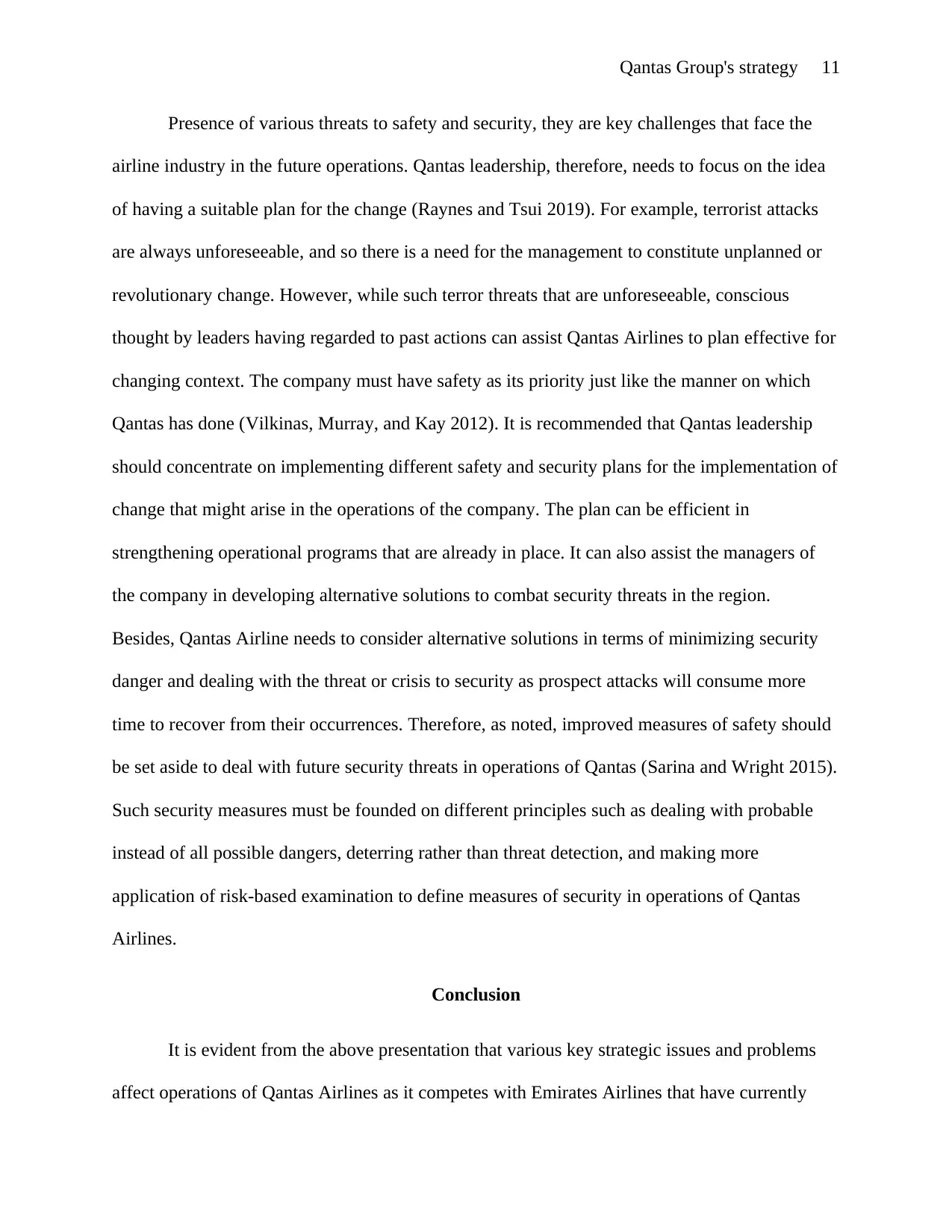
Qantas Group's strategy 11
Presence of various threats to safety and security, they are key challenges that face the
airline industry in the future operations. Qantas leadership, therefore, needs to focus on the idea
of having a suitable plan for the change (Raynes and Tsui 2019). For example, terrorist attacks
are always unforeseeable, and so there is a need for the management to constitute unplanned or
revolutionary change. However, while such terror threats that are unforeseeable, conscious
thought by leaders having regarded to past actions can assist Qantas Airlines to plan effective for
changing context. The company must have safety as its priority just like the manner on which
Qantas has done (Vilkinas, Murray, and Kay 2012). It is recommended that Qantas leadership
should concentrate on implementing different safety and security plans for the implementation of
change that might arise in the operations of the company. The plan can be efficient in
strengthening operational programs that are already in place. It can also assist the managers of
the company in developing alternative solutions to combat security threats in the region.
Besides, Qantas Airline needs to consider alternative solutions in terms of minimizing security
danger and dealing with the threat or crisis to security as prospect attacks will consume more
time to recover from their occurrences. Therefore, as noted, improved measures of safety should
be set aside to deal with future security threats in operations of Qantas (Sarina and Wright 2015).
Such security measures must be founded on different principles such as dealing with probable
instead of all possible dangers, deterring rather than threat detection, and making more
application of risk-based examination to define measures of security in operations of Qantas
Airlines.
Conclusion
It is evident from the above presentation that various key strategic issues and problems
affect operations of Qantas Airlines as it competes with Emirates Airlines that have currently
Presence of various threats to safety and security, they are key challenges that face the
airline industry in the future operations. Qantas leadership, therefore, needs to focus on the idea
of having a suitable plan for the change (Raynes and Tsui 2019). For example, terrorist attacks
are always unforeseeable, and so there is a need for the management to constitute unplanned or
revolutionary change. However, while such terror threats that are unforeseeable, conscious
thought by leaders having regarded to past actions can assist Qantas Airlines to plan effective for
changing context. The company must have safety as its priority just like the manner on which
Qantas has done (Vilkinas, Murray, and Kay 2012). It is recommended that Qantas leadership
should concentrate on implementing different safety and security plans for the implementation of
change that might arise in the operations of the company. The plan can be efficient in
strengthening operational programs that are already in place. It can also assist the managers of
the company in developing alternative solutions to combat security threats in the region.
Besides, Qantas Airline needs to consider alternative solutions in terms of minimizing security
danger and dealing with the threat or crisis to security as prospect attacks will consume more
time to recover from their occurrences. Therefore, as noted, improved measures of safety should
be set aside to deal with future security threats in operations of Qantas (Sarina and Wright 2015).
Such security measures must be founded on different principles such as dealing with probable
instead of all possible dangers, deterring rather than threat detection, and making more
application of risk-based examination to define measures of security in operations of Qantas
Airlines.
Conclusion
It is evident from the above presentation that various key strategic issues and problems
affect operations of Qantas Airlines as it competes with Emirates Airlines that have currently
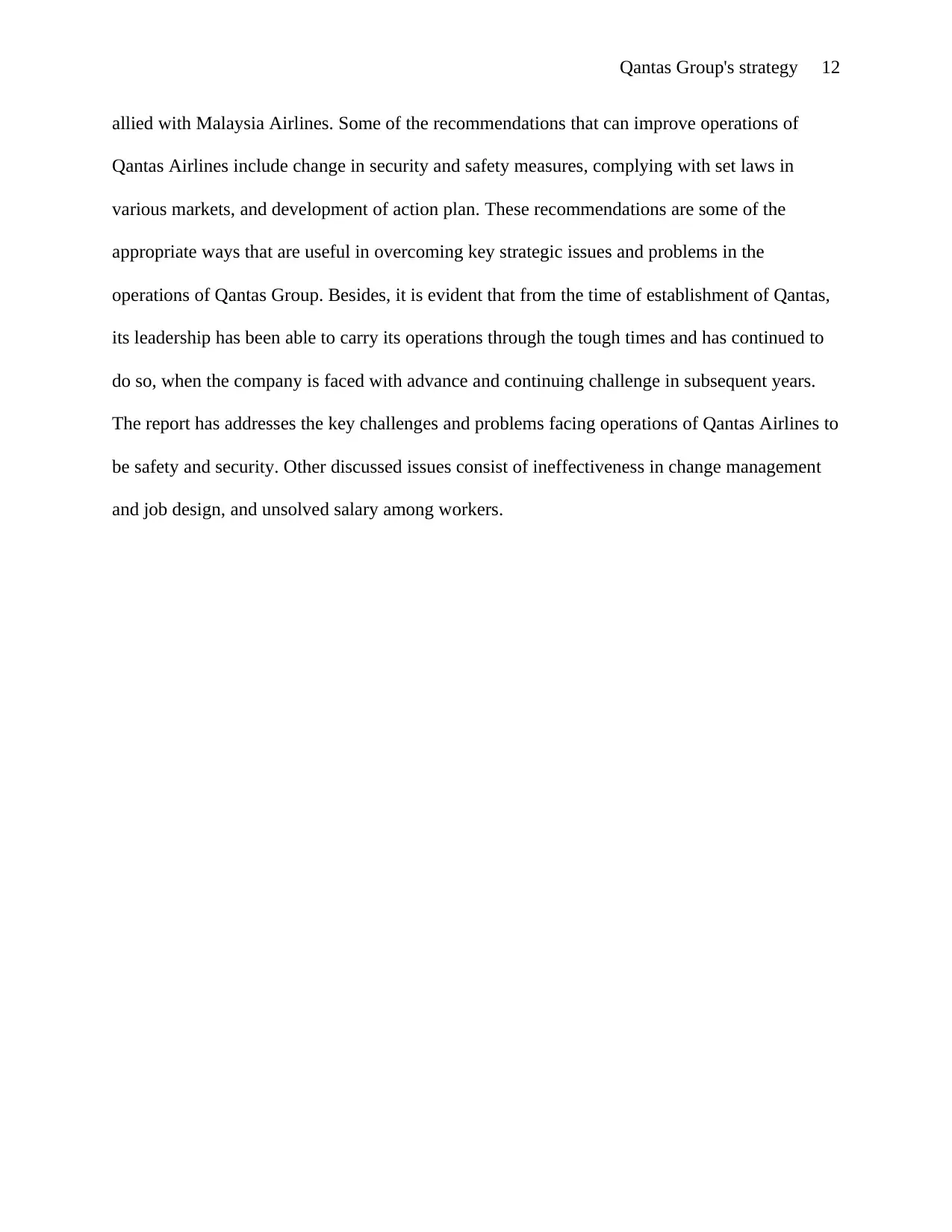
Qantas Group's strategy 12
allied with Malaysia Airlines. Some of the recommendations that can improve operations of
Qantas Airlines include change in security and safety measures, complying with set laws in
various markets, and development of action plan. These recommendations are some of the
appropriate ways that are useful in overcoming key strategic issues and problems in the
operations of Qantas Group. Besides, it is evident that from the time of establishment of Qantas,
its leadership has been able to carry its operations through the tough times and has continued to
do so, when the company is faced with advance and continuing challenge in subsequent years.
The report has addresses the key challenges and problems facing operations of Qantas Airlines to
be safety and security. Other discussed issues consist of ineffectiveness in change management
and job design, and unsolved salary among workers.
allied with Malaysia Airlines. Some of the recommendations that can improve operations of
Qantas Airlines include change in security and safety measures, complying with set laws in
various markets, and development of action plan. These recommendations are some of the
appropriate ways that are useful in overcoming key strategic issues and problems in the
operations of Qantas Group. Besides, it is evident that from the time of establishment of Qantas,
its leadership has been able to carry its operations through the tough times and has continued to
do so, when the company is faced with advance and continuing challenge in subsequent years.
The report has addresses the key challenges and problems facing operations of Qantas Airlines to
be safety and security. Other discussed issues consist of ineffectiveness in change management
and job design, and unsolved salary among workers.
⊘ This is a preview!⊘
Do you want full access?
Subscribe today to unlock all pages.

Trusted by 1+ million students worldwide
1 out of 15
Related Documents
Your All-in-One AI-Powered Toolkit for Academic Success.
+13062052269
info@desklib.com
Available 24*7 on WhatsApp / Email
![[object Object]](/_next/static/media/star-bottom.7253800d.svg)
Unlock your academic potential
Copyright © 2020–2025 A2Z Services. All Rights Reserved. Developed and managed by ZUCOL.





